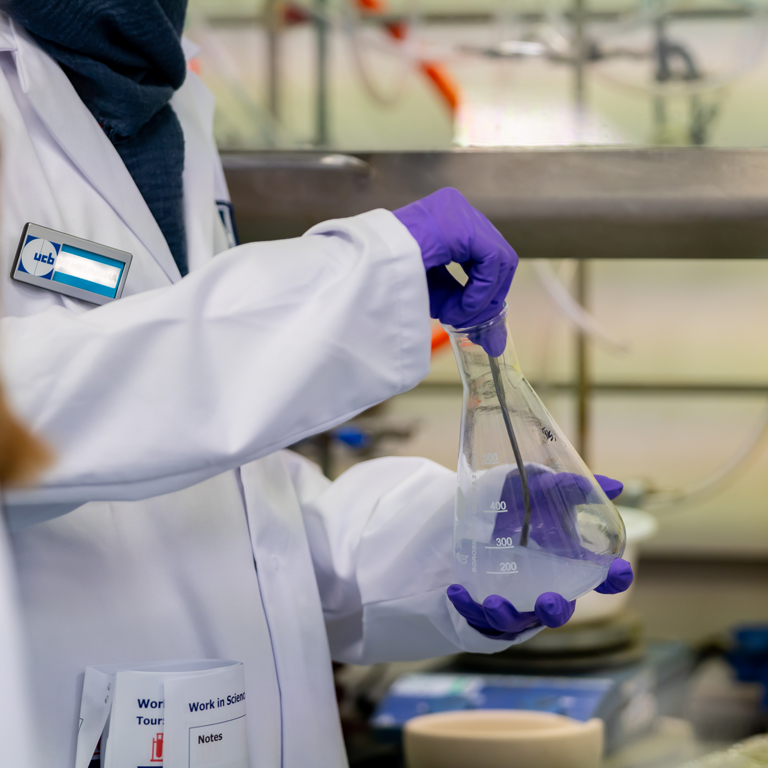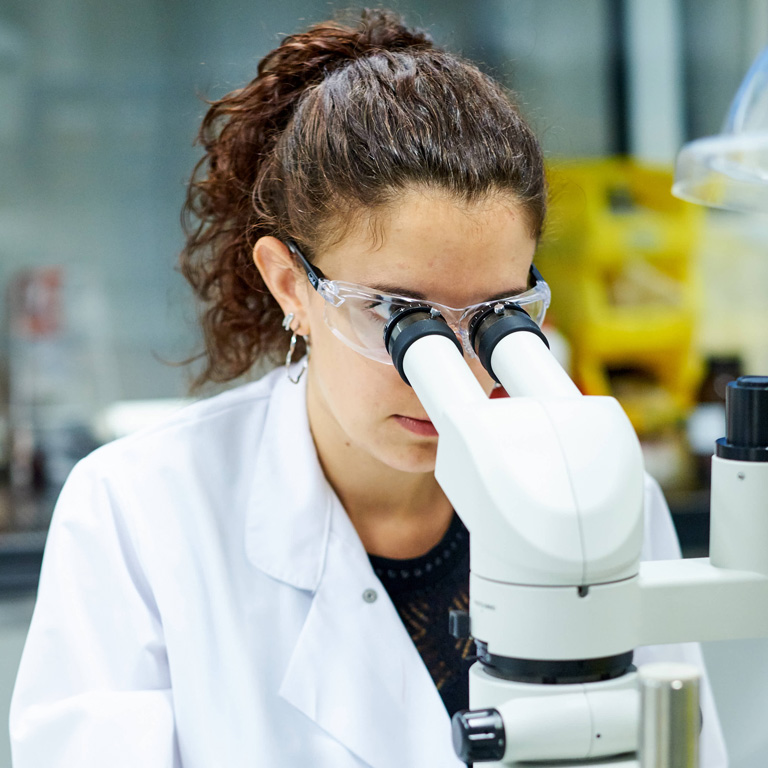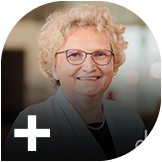12 Questions with
Laura Starkie
Laura Starkie leads the Target Validation and Tractability department for UK Research at UCB. In her role, she is responsible for furnishing the immunology portfolio with novel drug targets, combining analysis of academic activity, research into biological pathways, disease areas and therapeutic modalities. Laura has been a scientist, therapeutic project manager, and people leader at UCB over the past 17 years.
What are the main responsibilities of your current role?
We’re living in exciting times where the landscape is constantly evolving, so naturally, the work I do is also constantly changing too, which keeps things fresh and inspiring.
My focus at the moment is around identifying and developing new targets and projects for our UK portfolio. A key part of my work is bringing together disparate data points – whether from internal clinical data, research collaborations, or academic partnerships – to generate novel ideas that can help address future unmet medical needs.
What is your background prior to this role and how did it prepare you for the work you do now?
I started out in the fast-paced world of bispecific antibody discovery, where I had to juggle up to 20 different activities at once and adapt to constantly shifting targets. More recently, I’ve co-led therapeutic projects, pressure-testing ideas and ensuring we’re always pursuing the most promising paths. I believe in “walking the walk” as a project leader – if I wouldn’t be genuinely excited about an idea, it’s probably not the right one to pursue.
Finally, on a personal note, becoming a mum has profoundly shaped the way I work. It’s taught me to be laser-focused and intentional with my time, making sure that every effort delivers real impact. Ultimately, my journey has equipped me to thrive in a dynamic environment, juggle multiple demands, and bring out the best in the teams I collaborate with. And after all these years, I’m still just as excited about what’s ahead!
What motivates you about working in pharma?
I’ve always had a bit of a geeky side – I love maths, science, and understanding how life works, and it’s what led me to study biochemistry. Whilst I can confidently say that I still haven’t fully figured out how life works, every day in the industry is a school day. I love the rush of being in the lab, especially when working on a new drug for a target that hasn’t been approached in that way before. Now, I also really enjoy the strategic side – figuring out how to take an exciting new molecule and turn it into a treatment that can genuinely improve people’s lives.
What are your biggest long-term goals for five years or 10 years from now?
Our upcoming move to Windlesham will be a huge milestone for our research efforts. A key priority for me is maintaining the same fun, engaging, and authentic culture that we have built here in Slough, and creating an environment where people enjoy coming to work and can be their best selves.
From a scientific perspective, I would like to see one of the projects I’ve worked on progress through to clinic. One of the most fulfilling parts of being with a company long-term is watching a project grow from discovery all the way through to clinical development and, ultimately, launch.
What excites you most about current industry trends?
What excites me most about current industry trends is the growing focus on health equity and the push toward curative treatments. There's been a real effort to reach different demographics and broaden the impact of innovative therapies, but I’d love to see even more research into underserved populations.
The shift toward curative approaches, especially in cell therapies like CAR-T therapy in immunology, has shown incredible potential. Now, the challenge is to get smarter in delivering these breakthroughs to a wider group of patients across more diseases.
If you could change one thing about the pharma industry, what would it be?
I would say having a greater emphasis on holistic care. Too often, the focus is solely on treating illnesses with medication, rather than considering the whole patient experience – physical health, mental well-being, social interactions, and overall quality of life. I’d love to see a stronger integration of prevention, education, and lifestyle support alongside treatment.
How do you promote patient-centricity in your workplace?
One of the most rewarding activities we do is hosting our patient days here in Slough. These days connect us directly with those living with the very conditions that drive our daily work and inspire our research.
In the pharmaceutical industry, most people are here because they genuinely want to help patients. It’s not about introducing something completely new, but rather enhancing the patient-centric mindset that already exists. These stories serve as a reminder of why we do what we do – helping patients live better, healthier lives. By continuously sharing these real-world impacts, we can keep patient-centricity at the heart of everything we do.
How has the COVID-19 pandemic changed your work or your workplace culture?
There really is no replacement for in-person networking and ideation, and being together allows creative minds to bounce ideas off each other. I had not realised how important it was to even grab lunch in the canteen together and celebrate birthdays, but I very much appreciate this togetherness now.
I cannot remember how we used to work without communication technology like Microsoft Teams. I relish the flexibility these tools offer and the ability to keep in touch more easily when I am away from site.
How has digital technology changed your work or workplace culture?
We’re living in an extraordinary moment in scientific discovery where we can access vast datasets from anywhere and with ease. The difference today is speed: we can ideate, refine, and gather insights with unparalleled efficiency. However, we still need our scientists working in the labs, as we could not continue to pioneer new approaches to drug discovery without them.
What do you think pharma will look like in 15 years? 50 years?
I will be honest and say that I have absolutely no idea, but I am super excited to find out! One thing I can say for certain is that the industry will look dramatically different from how it does today. I hope that the industry will have started to deliver curative treatments across a wide range of diseases, for a wide range of populations.
What advice would you give to a young person starting out in your field?
Don't fear failure. If you're going to work in science and the pharmaceutical industry, you will quickly learn that most experiments fail, most ideas fail, and most projects fail. It is far from an easy business, but there is so much unity and value in embracing those learnings and working with a broad range of people to come up with new ideas, bouncing back so much stronger than before.
If you could have any superpower, what would it be?
My supervisor and I had the idea of molecular goggles when I was a molecular biologist, like lab goggles that could zoom in to atomic resolution. They would allow you to watch molecules interact and see why your experiment was not working.
Using these goggles on patient samples, you could visualise how molecules are changing and how they interact in real time, therefore revolutionising treatment design. If only they were real, maybe I would get a bit closer to working out how life works!
Connect with Laura Starkie on LinkedIn.
About UCB
UCB is a global biopharmaceutical company dedicated to discovering and developing treatments that aim to transform the lives of people living with neurological and immunological conditions, as well as rare diseases.
Connect with UCB UK&I on LinkedIn.
IE-OT-2500012 | February 2025
Supercharge your pharma insights: Sign up to pharmaphorum's newsletter for daily updates, weekly roundups, and in-depth analysis across all industry sectors.
Want to go deeper?
Continue your journey with these related reads from across pharmaphorum
Click on either of the images below for more articles from this edition of Deep Dive: Research and Development 2025



















